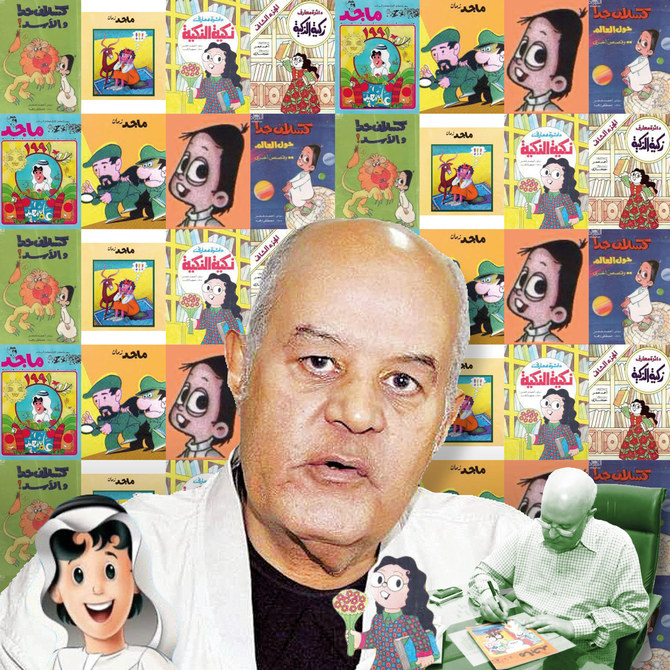RIYADH: Just as Walt Disney founded one of the world’s largest and most influential entertainment conglomerates, an Egyptian journalist is hailed as the “Walt Disney of the UAE” for his pivotal role in shaping the region’s media landscape with Majid Magazine.
For many Arab adults now in their 50s, the magazine and its beloved characters, like Majid, Kaslan Jiddan and Captain Khalfan, are cherished symbols of childhood joy. Yet, few recognize the creative genius behind these treasured memories: Ahmed Omar, who passed away on Aug. 9 at the age of 85.
His vision and storytelling prowess were crucial in shaping the magazine’s enduring legacy.
Born in Egypt in September 1939, Omar embarked on a lifelong journey with words and stories.
His passion for reading blossomed at a young age, and school and public libraries became his sanctuaries, where he delved into a world of diverse books and nurtured a profound love for literature.
Omar’s frequent visits to Cairo’s Azbakeya Book Market, where he discovered affordable secondhand books, helped him build a personal library filled with diverse titles. His extensive reading played a crucial role in shaping his vision and enriching his ideas, which later shone through in his literary works.
He read to build a deep reservoir of knowledge, with classical literature captivating him from an early age. Naguib Mahfouz’s novels, which delve into the intricacies of life in Egyptian neighborhoods, had a profound impact on him. Omar was also shaped by the works of renowned Egyptian writers like Yusuf Idris, Gamal El-Ghitani, Mohamed Hassanein Heikal and other prominent authors.
He began his professional career at the UAE’s Al-Etihad newspaper, where he was a founding member and contributed to laying its foundation. He later managed the local news section.
The most significant achievement of his career was establishing Majid Magazine for children and becoming its editor-in-chief in 1979. The idea for the magazine was born within Al-Etihad daily and eventually transformed into one of the most important children’s magazines in the Arab world.
Omar recognized the need for Arab children to have a publication that represented them, stimulated their imagination and nurtured their minds. Working alongside a talented team of journalists and illustrators, he turned the magazine into a platform for expressing the thoughts and emotions of Arab children through words and drawings.
Through his tireless efforts, Omar made the magazine a symbol of Arab childhood and a cherished part of the memories of successive generations.
He spent most of his time in the magazine’s offices, creating, planning, overseeing writers and content, and preparing issues. When a new issue was printed, he had several weeks’ worth of issues ready in advance.
The inaugural issue of the magazine was published on Feb. 28, 1979, with 5,000 free copies that quickly vanished from the shelves. Majid, a character representing human values rather than superpowers, struck a chord with children. Majid Magazine maintained a weekly publication schedule every Wednesday without fail, gaining significant popularity throughout the region.
Omar oversaw and managed the magazine with ultimate care and interest for almost 30 years. He provided guiding articles for children and wrote scripts for comic stories, enriching each issue with beloved characters such as Zaki the Clever and Captain Khalfan, among others.
His editorials in Majid Magazine served as weekly lessons for both children and adults, filled with educational messages and moral guidance. His contributions established him as an educational pioneer, as he dedicated his knowledge to serving the younger generation and imparting valuable lessons.
Through his deep understanding of the nuances and secrets of childhood, Omar succeeded in capturing the attention of children from across the Arab world. The magazine’s readership grew to hundreds of thousands of young readers.
The late journalist believed that nurturing a love of reading in children is a collective duty of families, schools and magazines alike. He famously remarked: “Instilling a reading habit early in life is crucial, as it is difficult to cultivate later on. Introducing a child to a magazine is not just about providing entertainment — it’s a crucial step toward nurturing a lifelong passion for reading.”
Since the inception of the magazine, Omar was dedicated to imbuing it with a distinctly Gulf Arab flavor, reflected in its content, stories and characters. He attracted leading children’s writers and cartoonists, ensuring the magazine resonated deeply with young readers across the Arab world by preserving the unique identity of Gulf children.
Notable characters such as Kaslan Jiddan, Fadooli, Abu Al-Dhurfaa, Zakiyah Al-Zakiyah, Shamsa and Dana, and Captain Khalfan and his assistant Fahman became beloved figures among the magazine’s young audience.
Omar emphasized that his magazine was designed to appeal to children growing up in a traditional environment, instilling religious values, cultural awareness and pride in their Arab heritage.
As a testimony to his magazine’s success, mail subscriptions to Majid flourished throughout the Arab World as fans eagerly awaited each issue every Wednesday. For decades, it managed to compete with translated comics magazines such as Mickey (licensed from Disney and translated in Egypt) and Little Lulu (licensed and translated in Lebanon).
Consequently, the magazine evolved alongside the UAE’s social progress and embraced digital advancements with a YouTube channel and a website, although critics would argue that it is nowhere as influential today — despite the additional reach provided by modern technology — as it once was in the 1990s and 1980s.






















